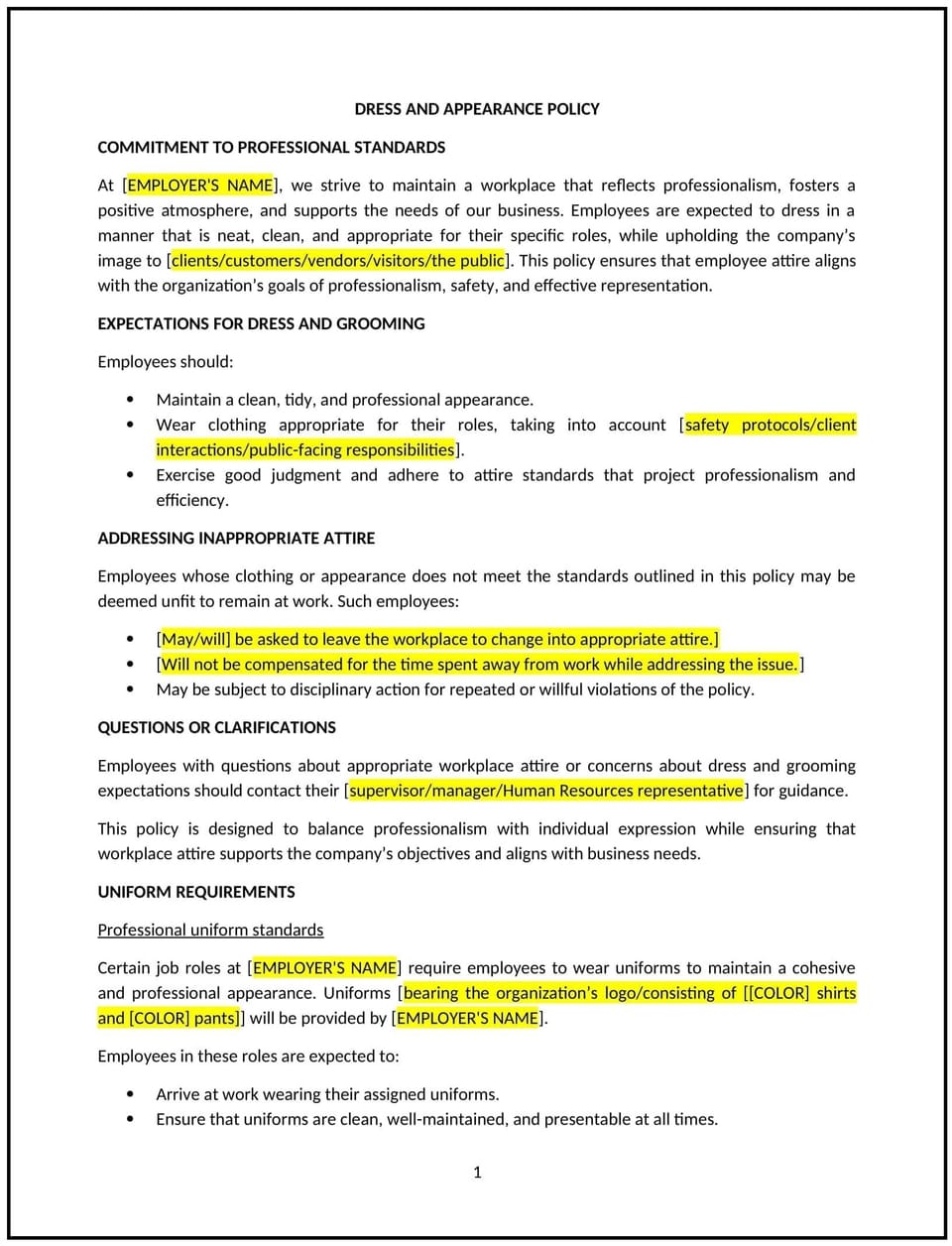Dress and appearance policy (Missouri): Free template

Dress and appearance policy (Missouri)
A dress and appearance policy helps businesses in Missouri establish clear expectations regarding professional attire, grooming, and overall appearance in the workplace. This policy outlines guidelines for what is considered appropriate attire based on the business environment, role, and any customer-facing interactions. It is designed to promote a professional and respectful work atmosphere while allowing for flexibility and personal expression.
By adopting this policy, businesses in Missouri can maintain a positive company image, foster professionalism, and support a respectful and inclusive work environment.
How to use this dress and appearance policy (Missouri)
- Define acceptable attire: Clearly specify the types of clothing and grooming that are considered appropriate for various work environments, including office attire, casual workdays, or client meetings.
- Set expectations for grooming: Include guidelines on personal grooming, such as hair, facial hair, and overall cleanliness, to maintain a professional appearance.
- Address special circumstances: Outline any accommodations or considerations for employees who may need exceptions, such as for religious or cultural reasons, or health-related needs.
- Clarify customer-facing requirements: Specify any additional appearance standards for employees who interact directly with customers, clients, or the public.
- Determine flexible options: If applicable, establish guidelines for more casual or flexible dress codes on certain days (e.g., casual Fridays), while maintaining professionalism.
- Include uniform requirements: If uniforms are required, detail the expectations for proper wear, maintenance, and any company-provided apparel.
- Set enforcement procedures: Specify how the policy will be enforced, including consequences for violations and how employees will be addressed if they do not meet the appearance standards.
- Review regularly: Periodically review and update the policy to ensure it reflects changing business needs, societal norms, and legal requirements.
Benefits of using this dress and appearance policy (Missouri)
This policy provides several benefits for businesses in Missouri:
- Promotes professionalism: A clear dress and appearance policy helps maintain a professional and polished image for both employees and the company.
- Reduces confusion: By setting clear expectations, businesses can prevent misunderstandings about what is considered acceptable attire and appearance in the workplace.
- Enhances workplace culture: A uniform or consistent appearance can create a sense of unity and belonging among employees, fostering a positive work environment.
- Supports inclusivity: A well-defined policy allows for flexibility and accommodations to respect personal, cultural, and religious expressions, ensuring all employees feel valued.
- Reflects company values: The policy helps align employee appearance with the company’s image and values, especially in customer-facing roles.
- Protects the company’s reputation: Ensuring employees maintain a professional appearance helps the business create a positive impression with clients, customers, and partners.
Tips for using this dress and appearance policy (Missouri)
- Communicate the policy clearly: Make sure all employees are aware of the policy through employee handbooks, onboarding, and regular reminders.
- Lead by example: Encourage leadership and management to model the expected dress and grooming standards to set a positive example for the team.
- Be consistent: Apply the policy consistently across all employees, ensuring fairness and avoiding confusion or favoritism.
- Offer flexibility: Consider providing flexibility for cultural, religious, or medical reasons, ensuring employees feel comfortable and respected while adhering to the policy.
- Monitor adherence: Regularly check that employees are following the dress code and address any issues promptly and respectfully.
- Review regularly: Regularly evaluate the policy to ensure it is still relevant, inclusive, and aligns with company values and changing workplace dynamics.
Q: Why should businesses in Missouri adopt a dress and appearance policy?
A: Businesses should adopt this policy to promote a professional, respectful, and inclusive work environment, set clear expectations for employee appearance, and ensure the company’s image aligns with its values.
Q: What types of attire are considered appropriate?
A: Businesses should define appropriate attire based on the work environment, such as business casual, formal office wear, or casual attire for certain roles. The policy should clearly outline what is expected for different workplace settings.
Q: Can employees express personal style within the dress code?
A: Businesses should specify the level of flexibility allowed for personal style while maintaining professionalism, such as allowing employees to express themselves through accessories or casual Fridays.
Q: Are there any special accommodations for religious or cultural attire?
A: Businesses should include provisions for making accommodations for religious or cultural attire, ensuring that employees are respected and can practice their beliefs while adhering to the policy.
Q: What should employees wear for customer-facing roles?
A: Businesses should specify additional standards for customer-facing employees, such as more formal attire or specific grooming requirements, to maintain a professional appearance in front of clients and customers.
Q: How will violations of the dress and appearance policy be handled?
A: Businesses should outline the consequences for policy violations, which may include informal warnings, formal notices, or corrective action, depending on the severity of the infraction.
Q: How often should businesses review the dress and appearance policy?
A: Businesses should review the policy regularly, especially when there are changes in company culture, legal requirements, or industry norms, to ensure it remains relevant and appropriate.
This article contains general legal information and does not contain legal advice. Cobrief is not a law firm or a substitute for an attorney or law firm. The law is complex and changes often. For legal advice, please ask a lawyer.


